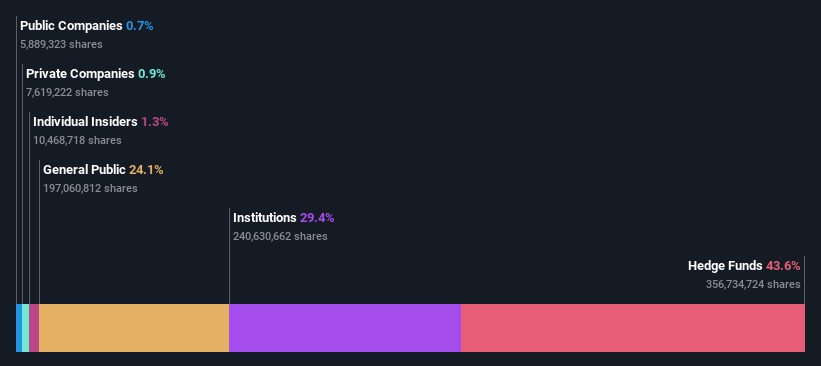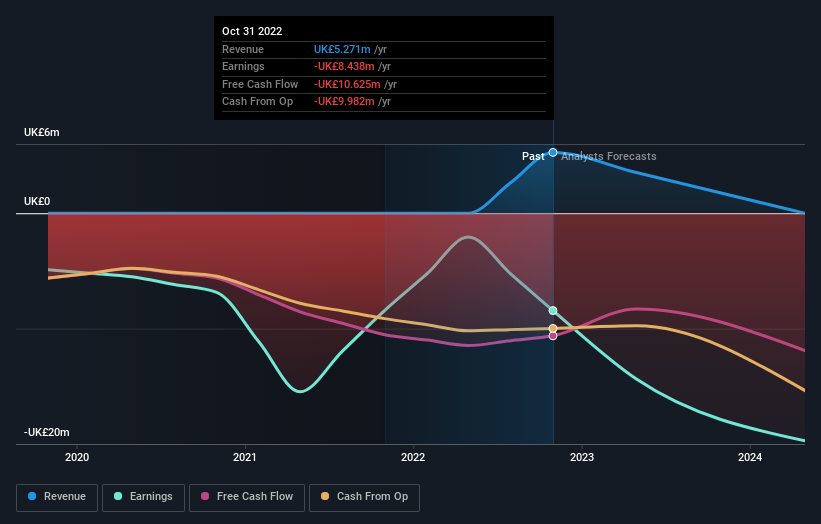Hedge funds investors are Scancell Holdings plc's (LON:SCLP) biggest bettors and were rewarded after last week's UK£25m market cap gain
Key Insights
Significantly high institutional ownership implies Scancell Holdings' stock price is sensitive to their trading actions
The top 4 shareholders own 52% of the company
Using data from company's past performance alongside ownership research, one can better assess the future performance of a company
If you want to know who really controls Scancell Holdings plc (LON:SCLP), then you'll have to look at the makeup of its share registry. We can see that hedge funds own the lion's share in the company with 44% ownership. That is, the group stands to benefit the most if the stock rises (or lose the most if there is a downturn).
Last week’s 23% gain means that hedge funds investors were on the positive end of the spectrum even as the company has shown strong longer-term trends. The one-year return on investment is currently 26% and last week's gain would have been more than welcomed.
In the chart below, we zoom in on the different ownership groups of Scancell Holdings.
See our latest analysis for Scancell Holdings
What Does The Institutional Ownership Tell Us About Scancell Holdings?
Institutional investors commonly compare their own returns to the returns of a commonly followed index. So they generally do consider buying larger companies that are included in the relevant benchmark index.
We can see that Scancell Holdings does have institutional investors; and they hold a good portion of the company's stock. This implies the analysts working for those institutions have looked at the stock and they like it. But just like anyone else, they could be wrong. If multiple institutions change their view on a stock at the same time, you could see the share price drop fast. It's therefore worth looking at Scancell Holdings' earnings history below. Of course, the future is what really matters.
Our data indicates that hedge funds own 44% of Scancell Holdings. That catches my attention because hedge funds sometimes try to influence management, or bring about changes that will create near term value for shareholders. Our data shows that Redmile Group, LLC is the largest shareholder with 29% of shares outstanding. In comparison, the second and third largest shareholders hold about 14% and 4.2% of the stock.
To make our study more interesting, we found that the top 4 shareholders control more than half of the company which implies that this group has considerable sway over the company's decision-making.
Researching institutional ownership is a good way to gauge and filter a stock's expected performance. The same can be achieved by studying analyst sentiments. While there is some analyst coverage, the company is probably not widely covered. So it could gain more attention, down the track.
Insider Ownership Of Scancell Holdings
The definition of company insiders can be subjective and does vary between jurisdictions. Our data reflects individual insiders, capturing board members at the very least. The company management answer to the board and the latter should represent the interests of shareholders. Notably, sometimes top-level managers are on the board themselves.
Most consider insider ownership a positive because it can indicate the board is well aligned with other shareholders. However, on some occasions too much power is concentrated within this group.
Our most recent data indicates that insiders own some shares in Scancell Holdings plc. As individuals, the insiders collectively own UK£1.7m worth of the UK£133m company. This shows at least some alignment, but we usually like to see larger insider holdings. You can click here to see if those insiders have been buying or selling.
General Public Ownership
The general public-- including retail investors -- own 24% stake in the company, and hence can't easily be ignored. This size of ownership, while considerable, may not be enough to change company policy if the decision is not in sync with other large shareholders.
Next Steps:
I find it very interesting to look at who exactly owns a company. But to truly gain insight, we need to consider other information, too. Take risks for example - Scancell Holdings has 4 warning signs (and 2 which make us uncomfortable) we think you should know about.
If you are like me, you may want to think about whether this company will grow or shrink. Luckily, you can check this free report showing analyst forecasts for its future.
NB: Figures in this article are calculated using data from the last twelve months, which refer to the 12-month period ending on the last date of the month the financial statement is dated. This may not be consistent with full year annual report figures.
Have feedback on this article? Concerned about the content? Get in touch with us directly. Alternatively, email editorial-team (at) simplywallst.com.
This article by Simply Wall St is general in nature. We provide commentary based on historical data and analyst forecasts only using an unbiased methodology and our articles are not intended to be financial advice. It does not constitute a recommendation to buy or sell any stock, and does not take account of your objectives, or your financial situation. We aim to bring you long-term focused analysis driven by fundamental data. Note that our analysis may not factor in the latest price-sensitive company announcements or qualitative material. Simply Wall St has no position in any stocks mentioned.

 Yahoo Finance
Yahoo Finance 

